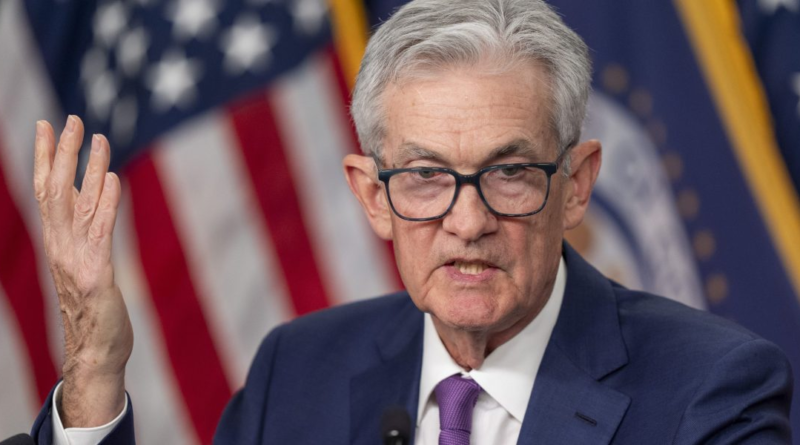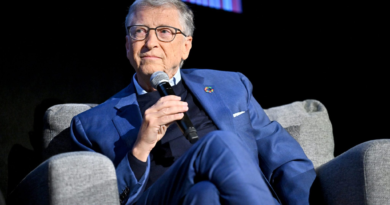Fed chair Powell says the Federal Reserve remains on track to cut interest rates 3 times this year
Chair Jerome Powell said in an interview broadcast Sunday night that the Federal Reserve remains on track to cut interest rates three times this year, a move that’s expected to begin as early as May.
Powell, in an interview recorded Thursday for the CBS news program “60 Minutes,” also said the nation’s job market and economy are strong, with no sign of a recession on the horizon.
“I do think the economy is in a good place,” he said, “and there’s every reason to think it can get better.”
Powell’s comments largely echoed remarks he gave at a news conference Wednesday, after the Fed decided to keep its key interest rate steady at about 5.4%, a 22-year high. To fight inflation, the Fed raised its benchmark rate 11 times beginning in March 2022, causing loans for consumers and businesses to become much more expensive.
The Fed chair also reiterated that the central bank’s next meeting in March was likely too soon for a rate cut. Most economists think the first cut is likely to come in May or June.
With inflation steadily cooling, nearly all the 19 members of the Fed’s policy-setting committee have agreed that cuts in the central bank’s key rate will be appropriate this year, Powell said in the “60 Minutes” interview. A reduction in that rate would help lower the cost of mortgages, auto loans, credit cards and other consumer and business borrowing.
In December, Fed officials indicated that they envisioned three rate cuts in 2024, reducing their benchmark rate to about 4.6% by year’s end. Powell told “60 Minutes” that that forecast likely still reflected policymakers’ views.
As gauged by the Fed’s preferred measure, inflation fell to just 2.6% in December compared with 12 months earlier. And in the second half of 2023, inflation was measured at an annual pace of just 2%, matching the Fed’s target level, down drastically from a peak of 7.1% in the summer of 2022.
Powell attributed the inflation surge of 2021-2022 to the disruptions of the pandemic, including a shift in spending away from services, like restaurant meals, to goods, like home office furniture and exercise bikes. At the same time, COVID closed down or slowed factories across the globe, severely disrupting supply chains and causing widespread shortages of goods and components. Both trends, Powell said, accelerated inflation.
At the same time, Powell acknowledged in the interview, the Fed misjudged the duration of the resulting inflation, which it repeatedly suggested would prove short-lived. As he has before, Powell said the central bank moved too slowly to raise its key rate, which can help slow borrowing and spending. Inflation began spiking in mid-2021 yet the Fed didn’t start raising rates until March 2022.
“So in hindsight, it would’ve been better to have tightened policy earlier,” Powell said, referring to rate hikes. “I’m happy to say that. … We thought that the economy was so dynamic that it would fix itself fairly quickly. And we thought that inflation would go away fairly quickly without an intervention by us.”
At his news conference Wednesday, Powell signaled that the Fed was likely to cut rates this year but underscored that central bank officials wanted to see further evidence that inflation is in check.
“It’s not that we’re looking for better data — it’s just that we’re looking for a continuation of the good data that we’ve been getting,” he said. “We just need to see more.”
Also Wednesday, Powell repeatedly acknowledged the strength of the U.S. economy and noted that inflation had slowed without the sharp rise in unemployment and weak growth that many economists had said would be necessary to cool consumer demand and slow price increases.
“We’ve got six months of good inflation data and an expectation that there’s more to come,” Powell said Wednesday. “So this is a good situation. Let’s be honest. This is a good economy.”
Other Fed officials have expressed caution about the prospect of rate cuts, particularly after a government report Friday showed that job growth soared unexpectedly in December, a sign that businesses remain confident enough in the economy to add many workers.
Michelle Bowman, a member of the Fed’s Board of Governors, said Friday that once it was clear that inflation was in check, it would eventually become appropriate to cut rates.
“In my view,” she said, “we are not yet at that point.”



